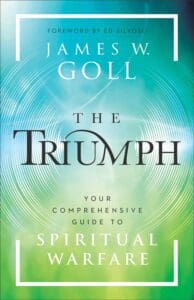- Home
- Spiritual Life
- How We Can Be Strong

How We Can Be Strong
 Excerpt taken from The Triumph: Your Comprehensive Guide to Spiritual Warfare by James W. Goll
Excerpt taken from The Triumph: Your Comprehensive Guide to Spiritual Warfare by James W. Goll
Chapter 13
How We Can Be Strong
The world is enthralled with superheroes. Blockbuster movies are filled with heroes from the Fantastic Four, the Avengers, Superman, Wonder Woman, and the leading men and women in the latest versions of Mission Impossible and Raiders of the Lost Ark. We love a loser who becomes a winner, and we love it when supernatural strength enters the picture. Everything changes. We cheer when someone is just about to quit and then finally, just at the last minute, the atmosphere changes and a shift happens!
Ephesians 6:10–14 gives us Spirit-led insight for how we can remain strong until we see our triumph come into being. This passage starts out with the word finally. “Finally, be strong in the Lord and in the strength of His might.” After all is said and done, after all the doctrine, the exhortations, and encouragements—there is one more thing. It’s as if Paul is saying, “I saved the best for last. Now pay close attention. You are going to need this warfare strategy.”
Some suggest that “finally” means “from now on,” or “for the remaining time,” and other Bible teachers refer to this as a period between the first and the second coming of Jesus. The idea is that from now on—at all times until Jesus comes again—we are at war. That’s what Paul is saying. So be on the alert. Be ready. Be armed. Most likely the imagery of armor came to Paul from his observations of the Roman soldier to whom he was chained (see Ephesians 6:20). So let’s look at the revelation God gave Paul about our warfare weapons.
Be Strong in the Lord (Verse 10)
Paul did not say, “Finally, be strong. Come on! You can do this!” Self-reliance in spiritual warfare is both dangerous and useless. We are not called to war in our own strength. We are admonished to be strong in the Lord. Do you need that reminder? I know I do.
Other Scripture shows the strength of god’s encouragement because He is with us. Joshua 1:6–9 records God’s words to Joshua as he was about to assume the leadership role that Moses had occupied before his death. Three times the Lord tells Joshua to be strong and courageous, and at the end of verse 9 we see that Joshua’s strength and courage is to be grounded in the reassuring promise that “the LORD your God is with you wherever you go.”
And how about 1 Samuel 30:6 (NLT) as an example of God’s unfailing presence? “David was now in great danger because all of his men were very bitter about losing their sons and daughters, and they began to talk of stoning him.” What happened next? David was greatly distressed, so he strengthened himself by scrolling through social media or watching Netflix? No! “David found strength in the LORD his God.”
Second Chronicles 20:15 (NLT) records a prophetic word from God that Jehoshaphat received: “Listen, all you people of Judah and Jerusalem! Listen, King Jehoshaphat! This is what the LORD says: Do not be afraid! Don’t be discouraged by this mighty army, for the battle is not yours, but God’s.” This is encouragement for you to give your battles to God. God will accept your battles and fight them for you—but you must give them to Him. God wants you to learn dependency on Him, to know that He is your sufficiency in all things, including emergencies.
I love the words of David recorded in Psalm 18:1, which says, “I love You, LORD, my strength.” And Psalm 18:31–32 tells us, “For who is God, but the LORD? And who is our rock, except our God, the God who encircles me with strength, and makes my way blameless?” I love that! God encircles me with strength. So be it, Lord!
Another psalm of David records his heart when Saul sent soldiers to watch David’s house to kill him. Psalm 59:16–17 says, “But as for me, I will sing of your strength. Yes, I will joyfully sing of Your faithfulness in the morning, for you have been my refuge and a place of refuge on the day of my distress. My strength, I will sing praises to You; for God is my refuge, the God who shows me favor.” Wow!
We find the promise of God’s strength again in Psalm 68:35: “The God of Israel Himself gives strength and power to the people. Blessed be God!” And Psalm 118:14 declares, “The LORD is my strength and song.”
God wants to give us His strength when we need it. How do we access God’s strength and power? Through prayer, fasting, by storing up the Word of God in our minds and our hearts, through fellowship and encouragement with others, through worship and praise, by taking the Lord’s Supper, through the anointing and being filled with the Holy Spirit, and by putting on the full armor of God. There are many ways to receive the strength of God.
Put on the Full Armor of God (Verse 11)
You were not born wearing God’s armor. You must take time and make the effort to put on each piece, and once you have the full armor on, leave it on. Walk in it, work in it, and sleep in it.
Do everything while wearing your armor. May Christians put it on and take it off depending on their circumstances. To be always protected, you must always wear the full armor of God at all times.
After Paul says to “be strong in the Lord and in the strength of His might,” he instructs, “Put on the full armor of God, so that you will be able to stand firm against the schemes of the devil.”
Two prominent Old Testament texts couple armor and God’s traits. Isaish 11:4 says. “Righteous will be the belt around His hips, and faithfulness the belt around his waist.” And Isaish 59:17 says, “He put on righteousness as a breastplate, and a helmet of salvation on His head, and He put on garments of vengeance for clothing and wrapped Himself with zeal as a cloak.”
While we will look at specific parts of our spiritual armor in future chapters, I want to declare loudly that God Himself is our warrior. Your most effective spiritual warfare weapon is God himself. If you are born again, Jesus lives inside you—Christ in you, the hope of glory (see Colossians 1:27).
God the Warrior is fighting to deliver and vindicate His children. The supernatural armor, which God himself wears, has been graciously made available to us. In other words, it is the armor of God not simply because He gives it, but because He wears it. It is heaven’s armament released onto the earth so that we can stand firm against the schemes of the devil.
What are the schemes of the devil? Evil tactics, secret agendas, temptations, accusations, intimidation, division, and other such assaults against individual believers—including systematic, institutional, and organizational stratagems and strategic plans against not just the Church, but societies worldwide.
While we can look at Scripture and history and see common schemes of the devil, I do not believe all his methods and tactics are explicitly revealed in Scripture. This is all the more reason to wear the full armor, not just a part of it. Last days battles require the body of Christ to be fully armed!
Our Struggle (Verse 12)
Ephesians 6:10 tells us to be strong in the Lord, not our own strength. Verse 11 makes us aware of God’s complete armor that helps us to stand against the enemy’s schemes. Then verse 12 shows us the nature of our battle against the enemy: it’s a spiritual struggle.
The Greek term translated for “struggle” is pale (Strong’s #3823) meaning “wrestling.” This “wrestling match” expression is used only once in the New Testament. Why did Paul use this sporting term pertaining to armor and military preparedness? Why not use the same words found in 2 Corinthians 10:4 or 1 Timothy 1:8—strategia or strateia (Strong’s #4752)—which mean “warfare”? The reason is very significant.
Wrestling was an extremely popular event in the athletic games held in Asia Minor, particularly in Ephesus, where Paul preached for a few years. In contrast to the flesh and blood wrestling that the readers in Ephesus would have been very familiar with, the true struggle of believers is a spiritual power encounter that requires spiritual weaponry.
New Testament scholar Clinton Arnold explains the following beliefs Ephesians had in the magical arts during the time of Paul:
Two ancient writers relate the humorous account of an Ephesian wrestler who traveled to Olympia, Greece, to compete in the Olympic games. The wrestler attached an amulet to his ankle that had the Ephesian letters inscribed on it. There were six magical names, probably referring to six powerful supernatural beings. The Ephesian wrestler was readily defeating his opponents and advancing in the event until the referee discovered the ankle bracelet! He then lost three successive matches.
Clinton Arnold believes that Paul may have been alluding to this story with this use of the word pale. He continues:
The allusion could have proved an effective way of communicating to the converts that they should no longer “put on” the Ephesia Grammata as an amulet (i.e. turn to magic), but should now “put on” the armor of God (i.e. the power of God). Furthermore, they would also understand in a fresh way that the struggle in which they have been enlisted as Christians is against supernatural “powers”—in fact, the very supernatural “powers” who were summoned to their aid by the Ephesia Grammata are now the attacking opponents which they need to resist!
Wrestling is a close encounter contact game in which you must pin your enemy, not once, but many times. It is in-your-face and hand-to-hand combat. Knowing the historical context reveals even more about the struggle with our own spiritual enemy.
This struggle is “not against flesh and blood.” Paul is saying that our struggle is not against humanity. Behind and beneath the daily earthly struggles with people, institutions, and ideologies is an unseen spiritual battle. We may have earthly and human antagonists, but we must realize that Satan works behind their efforts (also see Matthew 16:23).
Standing Firm (verses 11, 13, and 14)
Three times Paul tells the Ephesians to stand firm in verses 11, 13, and 14. He didn’t just say to stand. He said to stand firm. This means we are to hold our position, resist, refuse to surrender ground to the enemy, preserve, and maintain what has already been won.
How are we supposed to stand firm? With the full armor of God. The New Living Translation says we resist the enemy with “every piece of God’s armor.” Before Paul introduces the individual pieces of God’s armor, he says we need all of it. Why? “So that you will be able to resist on the evil day, and having done everything, to stand firm” (verse 13).
The “evil day” could be describing the entire present age, or occasions when the attack is especially intense, or possibly both. Regardless, with God’s full armor, we can stand firm in whatever season we find ourselves.
What you need to fight in one season is not the same as the next. After Jesus’ forty-day fast, the Bible says, “And he [the devil] departed from him [Jesus] for a season” (Luke 14:13 KJV). The devil didn’t leave Him permanently. The New Living Translation states, “When the devil had finished tempting Jesus, he left until the next opportunity came.”
Harassment can come from the enemy at times of the greatest potential in God. That is when God wants you to seek Him and find Him and push through that door into new opportunities.
…
Order your copy of The Triumph: Your Comprehensive Guide to Spiritual Warfare by James W. Goll
Trending Now
Sign up today for your Inspiration Today Daily Newsletter
Supercharge your faith and ignite your spirit. Find hope in God’s word. Receive your Inspiration Today newsletter now!
James W. Goll
Dr. James W. Goll is founder of God Encounters Ministries and the bestselling author of more than 50 books and dozens of Bible study guides. An internationall respected prophetic leader, he's shared the love of Jesus in more than 50 nations, teaching and imparting the power of intercession, prophetic ministry, and life in the Spirit. Learn more at GodEncounters.com.
Related Articles
February 26, 2026
Chased by God’s Blessings—How to Attract God’s Blessings and Walk in His Favor
The key to God’s amazing turnaround plan for you to walk in His favor in every area of life. Have…
February 25, 2026
Finish Strong with a Kingdom Mindset
For if you keep silent at this time, relief and deliverance will rise for the Jews from another…
February 23, 2026
The Joy of Being His Workmanship
When life urges us to strive harder and do more, Scripture invites us to rest in a freeing truth:…
February 20, 2026
Stepping Out in Faith When God Calls You to the Impossible
Stepping out in faith often feels uncomfortable—especially when God calls you toward something that…
Next Steps To Strengthen Your Walk
Inspiration Today Newsletter
Supercharge your faith and ignite your spirit. Find hope in God’s word. Receive your Inspiration Today newsletter now!
Christian Articles
Find articles to strengthen your walk and grow your faith. We have a wide range of topics and authors for you.
Submit A Prayer Request
We are here for you. Simply click on the button below to reach us by form, email or phone. Together we will lift our hearts and voices with you in prayer.





